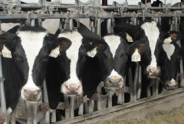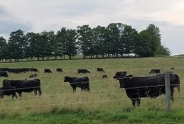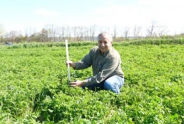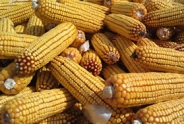Interim Guidance for Animal Care Operations
Ashley McFarland, Area Livestock Specialist
Central New York Dairy and Field Crops
This guidance is provided for animal agriculture workers to include those employed in veterinary health; manufacturing and distribution of animal medical materials and supplies, animal vaccines, animal drugs, feed, and bedding, etc.; raising of animals; animal production operations; transportation of live animals, animal medical supplies; transportation of deceased animals for disposal; livestock markets, including live bird markets, slaughter and packing plants. It also includes equine operations and companion animal/pet stores and shelters; veterinary services for equine, companion animal and other businesses considered essential; and related support/service operations.
Background:
In December 2019, a new respiratory disease called Coronavirus Disease 2019 (COVID-19) was detected in China. COVID-19 is caused by a virus (SARS-CoV-2) that is part of a large family of viruses called coronaviruses.
On March 20, 2020, Governor Cuomo signed the PAUSE" Executive Order, a 10-point policy to assure uniform safety for everyone. It includes a new directive that all non-essential businesses statewide must close in-office personnel functions effective at 8PM on Sunday, March 22. Essential businesses are exempt from this guidance. Animal care operations, as defined below, have been deemed essential and are exempt.
Animal Care Operations:
For purposes of Executive Order 202.6, animal care operations are defined as the following businesses/activities:
Livestock/Equine/Captive Cervids
• Feeding • Barn or facility maintenance, stall cleaning and enclosure repair • Turnout and exercise • Essential hoof maintenance and veterinary care • Transportation necessary to meet any of the above functions • Agribusiness that supports any of the above functionsCompanion Animals
• Care and feeding of companion animals in shelters, kennels, rescues, operations and pet stores • Pet food manufacturers, distributors, and retailers • Essential veterinary care, including spay/neuter, treatment for infectious disease • Animal shelters receiving seized, lost or abandoned animals • Adoption of animals from within New York State • Pet boarding facilities • Service dog training and careIf a business does not fall within this guidance, but you believe that it is essential or it is an entity providing essential services or functions, you may request designation as an essential business. To request designation as an essential business, please click here.
Animal Care/Boarding Facilities:
If you have an animal at a privately-owned facility, terms regarding client use and visitation rests with that business owner. Social distancing must be adhered to.
For equine: It is permissible to have horse owners as the primary providers of daily care for their own horses at boarding facilities, however business owners and horse owners must collaborate to minimize the number of people in the stable and to adhere to social distancing.
*There is no evidence that animals, including pets, in the United States might be a source of infection/can spread this new coronavirus. To date, CDC has not received any reports of pets or other animals becoming sick with COVID-19.
FOR EMPLOYEES
Cleaning/Disinfecting and Social Distancing:
All privately-owned facilities must practice social distancing, and proper cleaning and sanitizing of the facility. This includes:
- • Regular hand washing with soap and water for at least 20 seconds should be done:
- • Before and after eating.
- • After sneezing, coughing, or nose blowing.
- • After touching face, hair, cellphone and/or clothing.
- • After using the restroom.
- • Before handling food.
- • After touching or cleaning surfaces that may be contaminated.
- • After using shared equipment and supplies.
- • Cover coughs and sneezes with tissues or the corner of elbow.
- • Dispose of soiled tissues immediately after use.
It is encouraged to post signage with hand washing procedures in prominent locations. Clean and disinfect buildings and equipment as outlined in this guidance.
For additional information, visit the links below:
• NYS Department of Agriculture and Markets • NYS Department of Health • CDC COVID Guidance for Animals • CDC COVID FAQ for Animals • CDC COVID Guidance for Pet Owners if in Isolation PRO-DAIRY e-Alert MARCH 23, 2020
________________________________________
Diversity and Inclusion are part of Cornell's heritage. We are a recognized employer and educator valuing AA/EEO, Protected Veterans and Individuals with Disabilities. ________________________________________
For more information about PRO-DAIRY, go to: http://prodairy.cals.cornell.edu/
Julie Berry, Editor | Tom Overton, Director
Upcoming Events
Fresh Cow Health Disorders - Spanish
July 19, 2024
July 26, 2024
August 2, 2024
August 9, 2024
August 16, 2024
August 23, 2024
August 30, 2024
Free webinar series in Spanish.
Calving Workshop
August 6, 2024 : Calving Workshop
Herkimer, NY
English / Spanish program. Limited to 8 English speaking & 8 Spanish speaking participants. Lunch included.
Announcements
Document and Share Storm Damage
Mother nature has really been difficult over the last few days. Significant damage has been seen throughout NYS. Please let us know what types of damage your farm may have sustained during this time. This could be in the form of property damage, lost power, milk dump due to lost power, loss of livestock, loss of stored feed or growing crops.Farms are encouraged to DOCUMENT AND SHARE any impacts the weather may have had on their home or business. This could include structure damage, crop loss, inventory loss due to power outages, damage to equipment or fencing, and more.
If your farm experienced any sort of damage, please reach out to any of the folks listed below (or all of them). The more impact information that is collected, the greater the likelihood of a disaster declaration which can bring vital emergency support and awareness. The CNYDLFC Team will continue to collect detail and submit to NYSDAM and the EDEN network.
Reporting Weather Related Impacts (For your home or farm business)
- First, ensure that all the people and animals on your farm are safe, and that there aren't any unsafe working conditions created because of the weather (check your structures!). If there's an emergency, call 911 - don't try to manage it all on your own.
- Second, document all negative weather impacts for your farm and their estimated financial cost. Take photos, make estimates, and put it all in a safe place.
- Reach out to your insurance providers - farm, vehicle, crop, etc. to initiate the claim process as needed.
- Then, share your farm's damage with any (or all) of the ag support agencies listed below. We all work together to collect storm damage information and funnel it up to Ag and Markets which can initiate a natural disaster declaration.
- Chenango: 607-334-5841
- Fulton/Montgomery: 518-853-2135
- Herkimer: 315-866-7920
- Madison: 315-684-3001
- Otsego: 607-547-2536
- Schoharie: 518-234-4303
- Saratoga: 518-885-8995
- Nicole Tommell: 315-861-6001
- Erik Smith: 315-219-7786
- Daniela Gonzalez: 315-749-3486
- Ashley McFarland- 315-604-2156
Your county USDA/FSA service center.
- Chenango: 607-334-3231
- Fulton/Montgomery: 518-853-4015
- Herkimer: 315-866-2520
- Madison:315-824-9076
- Otsego: 607-547-8131
- Schoharie: 518-295-8600
- Saratoga: 518-692-9940
Your county farm bureau manager
- Region 3: Bailey Coon: 518-937-0566
- Region 5: John Wagner: 315-761-9770
- Region 6: Natally Batiston: 518-937-0269
- Region 7: Todd Heyn: 518-431-9338
Please let us know how we can help you.
Cash Rent and Custom Harvest Survey
To date, there is limited information available about rental rates and fees for crop harvesting. Farms can use this valuable information for their farm business planning to help improve decision making and profitability.Farmers Can Join MeatSuite For Free!
MeatSuite.com is a free resource provided by Cornell University where NY meat farmers can create a farm profile and list their bulk (wholes, halves, quarters) and bundled (i.e. Grilling Bundle) meat products.Why should farmers join?
1. It's free and easy!
2. Connect with more local customers. In the past year the MeatSuite.com farm directory had 8,300 visits from New York consumers. Farm profiles get as many as 25 views per month from potential local customers. We also spotlight MeatSuite farms on social media and bring attention and purchases to farms through highlights and giveaways.
How do I join?
Farmers can visit https://www.meatsuite.com/farmers/ to create a free farm profile. You must list at least one product for your farm's profile to go live. You'll also have access to Cornell's free Meat Price Calculator, a helpful tool for pricing your meat to make a profit.
While you're on MeatSuite, check out the "Creating Consumer-Friendly Bulk Meats" publication on the log-in page. It has tips on how to create bulk meat products that are easier for first-time buyers to say "yes" to.
If you have any questions as you create your farm profile or products, we're here to help! Please email Matt LeRoux at mnl28@cornell.edu.




